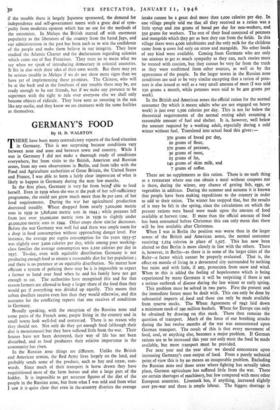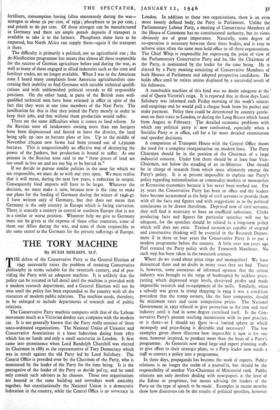GERMANY'S FOOD
By H. D. WALSTON
THERE have been many contradictory reports of the food situation in Germany. This is not surprising because conditions vary between zone and zone and between town and country. While I was in Germany I did not make a thorough study of conditions everywhere, bin from visits to the British, American and Russian zones, from my own observations in Berlin, and from talks with the Food and Agriculture authorities of Great Britain, the United States and France, I was able to form a fairly clear impression of what is likely to happen in Germany during the next few months.
In the first place, Germany is very far from being able to feed herself. Even in 1939 when she was at the peak of her self-sufficiency programme, she could not grow much more than 8o per cent, of her food requirements. During the war her agricultural production decreased steadily. Wheat dropped from nearly 5,000,000 metric tons in 1939 to 3,808,000 metric tons in 1944; while potatoes fell . from just over 50,000,000 metric tons in 1939 to slightly under 40,000,000 metric tons in 1944. Other crops show similar decreases. Before the war Germany was well fed and there was ample room for a drop in food consumption without approaching danger level. For instance, the average per capita consumption for the years 1933-37 was slightly over 3,000 calories per day, while among poor working- class families the average consumption was 2,100 calories per day in 1937. To-day, even with equitable distribution Germany is not producing enough food to ensure a reasonable diet for her population ; and there is no pretence at an equitable distribution. No matter how efficient a system of policing there may be it is impossible to expect a farmer to hand over food when he and his family have not got enough to eat. The authorities have recognised this and for that reason farmers are allowed to keep a larger share of the food than they would get if everything was divided up equally. This means that urban dwellers receive even less than they would otherwise, and this accounts for the conflicting reports that one receives of conditions in Germany.
Broadly speaking, with the exception of the Russian zone and some parts of the French zone, people living in the country and in small towns look well-fed and contented. There is no reason why they should not. Not only do they get enough food (although their diet is monotonous) but they have suffered little from the war. Their houses have not been destroyed, their way of life has not been disturbed, and as food producers their relative importance in the community has risen.
In the Russian zone things are different. Unlike the British and American armies, the Red Army lives largely on the land, and probably sends some of the produce, such as hay and straw, east- wards. Since much of their transport is horse drawn they have requisitioned most of the farm horses and also a large part of the fodder. It is impossible to get accurate figures of the diet of the people in the Russian zone, but from what I was told and from what I saw it is quite clear that even in the-eounuy districts the average
intake cannot be a great deal more than i,000 calories per day.. In one village people told me that all they received as a ration was a little syrup and 200 grams of bread per day for non-workers, and 350 grams for workers. The rest of their food consisted of potatoes and mangolds which they get as best they can from the fields. In this village there were 4,000 inhabitants and the only milk for the children came from 9 cows fed only on straw and mangolds. No other foods of any kind were available. Coming from Germans who are only too anxious to get as much sympathy as they can, such stories must be treated with caution, but they cannot be very far from the truth as they were confirmed from other sources, as well as by the appearance of the people. In the larger towns in the Russian zone conditions are said to be very similar excepting that a ration of pota- toes is also issued as well as a very small amount of meat (I was told 15o grams a month, while potatoes were said to be 400 grams per week).
In the British and American zones the official ration for the normal consumer (by which is meant adults who are not engaged on heavy work) is just over 1,5oo calories per day. This is not far below the theoretical requirements of the normal resting adult assuming a reasonable amount of fuel and shelter. It is, however, well below the amount required by a working adult, especially during a cold winter without fuel. Translated into actual food this gives :—
370 grams of bread per day,
20 grams of flour,
570 grams of potatoes, 30 grams of meat, 23 grams of fat, 140 grams of skim milk, and 7 grams of coffee.
There are no supplements to this ration. There is no such thing as a restaurant where one can obtain a meal without coupons nor
is there, during the winter, any chance of getting fish, eggs, , or vegetables in addition. During the summer and autumn it is known
that people have been making expeditions to the country in order to add to their ration. The winter has stopped that, but the results of it may be felt in the spring, since the calculations on which the present rations were based were made upon the amount of food available at harvest time. If more than the official amount of food has been consumed before Christmas this can only mean that there will be less available after Christmas.
When I was in Berlin the position was worse than in the larger towns of the British and American zones, the normal consumer receiving 1,224 calories in place of i,5o7. This has now been altered so that Berlin is more closely in line with the others. There is, however, in Berlin—as there is in some of the larger cities of the Ruhr—a factor which cannot be properly evaluated. That is, the effect on morale of living in a devastated city surrounded by nothing but ruins and with little, if any, protection, from snow and wind.
When to this is added the feeling of hopelessness which is being experienced by many Germans it will be surprising if there is not a serious outbreak of disease during the late winter or early spring. This problem must be solved in two parts. First the present and the immediate future must be dealt with. This can only be done by substantial imports of food and these can only be made available from reserve stocks. The Wheat Agreement of 1942 laid down a minimum stock of 290 million bushels. Wheat for Europe can only be obtained by drawing on this stock. There then remains the question of transport. Much of the force of our bombing attacks during the last twelve months of the war was concentrated upon German transport. The result of this is that every movement of food, coal, or anything else, becomes a major problem. If German rations are to be increased this year not only must the food be made available, but more transport must be provided.
For next year and the year after we should concentrate upon increasing Germany's own output of food. From a purely technical point of view this is by no means an insuperable problem. Excluding the Russian zone and those areas where fighting has actually taken place, German agriculture has suffered little from the war. There
are certain shortages of machinery, but few compared with most other. European countries. Livestock has, if anything, increased slightly over pre-war and there is ample labour. The biggest shortage is
fertilisers, consumption having fallen enormously during the war— nitrogen to about 50 per cent. of 1939 ;•phosphates to 30 per Cent.; and potash to 6o per cent. Of these nitrogen can be manufactured in Germany and there are ample potash deposits if transport is available to take it to the farmers. Phosphates alone have to be imported, but North Africa can supply these—again if the transport is there.
The difficulty is primarily a political, not an agricultural one ; the de-Nazification programme has meant that almost all those responsible for the success of German agriculture before and during the war, as well as many of those engaged in allied industries such as the corn and fertiliser trades, are no longer available. When I was in the American zone I heard many complaints from American agriculturalists con- cerning their inability to find Germans with suitable technical qualifi- cations and with unblemished political records to fill responsible positions. On the other hand, in parts of the British zone well- qualified technical men have been retained in office in spite of the fact that they were at one time members of the Nazi Party. The justification for this is that they joined the Party merely in order to keep their jobs, and that without them production would suffer.
There are the same difficulties when it comes to land reform. In the Russian zone all landowners owning more than too hectares have been dispossessed and forced to leave the district, the land being split up into to hectare plots or less. Up to the middle of November 27o,000 new farms had been created out of 1,25o,000 hectares. This is unquestionably an effective way of destroying the power of the Junkers, but production is bound to suffer. As one peasant in the Russian zone said to me "these pieces of land are too small to live on and are too big to be buried in."
If we decide to pursue similar policies in the zone for which we are responsible, we must do so with our eyes open. We must realise that it will mean, during the next few years, a reduction in output. Consequently food imports will have to be larger. Whatever the decision, we must make it now, because now is the time to make our plans for the feeding of Germany during the winter of 1946-47. I have written only of Germany, but that does not mean that Germany is the only country in Europe which is facing starvation. There is scarcely a country in central or southern Europe that is not in a similar or worse position. Whatever help we give to Germany must not be given at the expense of those other countries, some of them our Allies during the war, and none of them responsible to the same extent as the Germans for the present sufferings of Europe.































 Previous page
Previous page